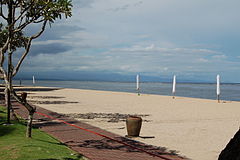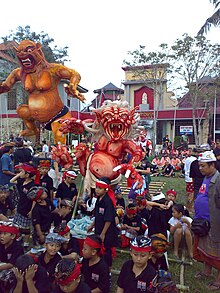Nyepi
 From Wikipedia - Reading time: 10 min
From Wikipedia - Reading time: 10 min
| Nyepi | |
|---|---|
 A Balinese beach at Nyepi | |
| Also called | Day of silence |
| Observed by | Balinese Hinduism |
| Type | Hindus, cultural |
| Celebrations | Perform tapa brata penyepian |
| Observances | Prayers, religious rituals, fasting |
| Begins | 06:00 |
| Ends | 06:00 the next day |
| Date | Hindu Balinese Saka 1 Kedasa |
| 2023 date | 22 March |
| 2024 date | 11 March |
| 2025 date | 29 March |
Nyepi is a Balinese "Day of Silence" that is commemorated every Isakawarsa (Saka new year) according to the Balinese calendar (in 2024, it falls on March 11).
Nyepi, a public holiday in Indonesia, is a day of silence, fasting and meditation for the Balinese. The day following Nyepi is also celebrated as New Year's Day.[1][2] After Nyepi, youths of Bali in the village of Sesetan in South Bali practice the ceremony of omed-omedan or 'The Kissing Ritual' to celebrate the new year.[3]
Rituals
[edit]Observed from 6 a.m. until 6 a.m. the next morning, Nyepi is a day reserved for self-reflection, and as such, anything that might interfere with that purpose is restricted. The main restrictions are no lighting fires (and lights must be kept low); no working; no entertainment or pleasure; no traveling; and, for some, no talking or eating at all.
The effect of these prohibitions is that Bali's usually bustling streets and roads are empty, there is little or no noise from TVs and radios, limited access to Internet and few signs of activity are seen even inside homes. The only people to be seen outdoors are the pecalang, traditional security men who patrol the streets to ensure the prohibitions are being followed.
Although Nyepi is primarily a Hindu holiday, non-Hindu residents and tourists are not exempt from the restrictions in Bali. Although they are free to do as they wish inside their hotels, no one is allowed onto the beaches or streets, and the only airport in Bali remains closed for the entire day. Tourists who violate the rules could face deportation.[4]
On the afternoon and evening before Nyepi, accessibility on roads is limited. Many local roads are closed for the parade in the evening, making it difficult to navigate by car or scooter. Most local restaurants close early and many ATMs are switched off with the cash removed until the day following Nyepi.[5]
The indirectly-state-owned consumer communications provider Telkomsel shuts down all internet access, while privately owned ISPs remain operational. Some hotels/resorts choose to shut down WiFi coverage, while others choose to let it remain operational.
Electricity remains operational in Bali, while being shut off in Nusa Penida (2023).
The only exceptions granted are for emergency vehicles responding to life-threatening conditions and women going into labor.[6][7]
On the day after Nyepi, known as Ngembak Geni (Relighting the Fire), social activity picks up again quickly, as families and friends gather to ask forgiveness from one another, and to perform certain religious rituals together. Fires and electricity are allowed again, and cooking of food resumes. Nyepi can be traced as far back as 78 A.D.[8]

- First, the Melasti ritual is performed 3–4 days beforehand. It is dedicated to Sanghyang Widhi Wasa. The ritual is performed in several puras (Balinese temple) near the sea and beaches. It is meant to purify Arca, Pratima, and Pralingga (sacred objects) belonging to several temples, also to acquire sacred water from the sea.[10][11]
- Second, the Bhuta Yajna ritual is performed in order to vanquish the negative elements and create a balance with God, mankind, and nature. The ritual is also meant to appease Batara Kala by Pecaruan offering of live animal sacrifice. Around sunset the Pengrupukan or Ngrupuk[12] ceremony begins in the house compounds with the noisy banging of pots and pans and bamboo tubes along with burning of dried coconut leaf torches to drive out the demons.[13] The Ngrupuk parade is a new phenomenon: it started in Denpasar in the early 1980s.[14]

Most Hindu Balinese villages make Ogoh-ogoh, demonic statues made of richly painted bamboo, papier-mâché, cloth, and tinsel symbolising negative elements or malevolent spirits or even characters from Hindu mythology. After the Ogoh-ogoh have been paraded around the village, they are burned in the cemeteries although many are displayed in front of community halls for another month or more and sometimes even purchased by museums and collectors.

- Third, the Nyepi rituals are performed as follows:[15]
- Amati Geni: No fire or light, including no electricity
- Amati Karya: No working
- Amati Lelunganan: No travelling
- Amati Lelanguan: No revelry/self-entertainment
- Fourth, the Yoga/Brata ritual starts at 6:00 a.m. and continues to 6:00 a.m. the next day.
- Fifth, the Ngembak Agni/Labuh Brata ritual is performed for all Hindus to forgive each other and to welcome the new days to come.[16]
- Sixth and finally, the Dharma Shanti rituals are performed after all the Nyepi rituals are finished.[6]
Dates
[edit]| CE year | Balinese year |
Nyepi date |
|---|---|---|
| 2024 | 1946 | 11 March |
| 2025 | 1947 | 29 March |
| 2026 | 1948 | 19 March |
In 2024 the Ogoh-Ogoh parades were cancelled because of the general election being so close to the date of the festival, the regional government fearing that the parade may be used to convey political themes. Only villages, in particular the traditional villages, were allowed to hold the parade.[17]
Related festivals
[edit]The festival is related to those observed by Hindus in the Indian subcontinent, although the dates are not the same due to the different calendars. For example, the Hindus of Maharashtra term their new year Gudi Padwa (in Marathi: गुढी पाडवा). The Sindhis, people from Sindh, celebrate the beginning of their calendar year as Cheti Chand. The Manipuris celebrate their new year as Sajibu Nongma Panba. The Hindus of Andhra Pradesh and Karnataka also celebrate their new year as Ugadi.
Security
[edit]Security is provided by the usual hansip, while the pecalang are redirected into security roles from their usual mundane tasks like traffic coordination to beef up the local security. These two security forces report to local village heads. In 2017, it is reported islandwide that some 22,000 pecalang are taking part for Nyepi.[18] National police also take part, but naturally ultimately report to Jakarta rather than the village or regency level.
See also
[edit]References
[edit]- ^ Hogue, Thomas (2006-03-24). "In Bali, a holiday for the ears". The New York Times. New York. ISSN 0362-4331. Retrieved 2011-03-07.
- ^ Onishi, Norimitsu (2011-03-06). "Silence Befalls Bali, but Only for a Day". The New York Times. New York. ISSN 0362-4331. Retrieved 2011-03-07.
- ^ "Upacara omed-omedan: Ritual Ciuman Unik Khas Bali" ["Omed-omedan ceremony: Bali's Unique Kissing Ritual"] (in Indonesian). travelesia.co. Archived from the original on 2014-06-06. Retrieved 6 June 2014.
- ^ Erviani, Ni Komang (27 Mar 2023). "Two Polish nationals deported from Bali for ignoring Nyepi strictures". The Jakarta Post. Retrieved 22 May 2024.
- ^ "We Visited Bali During Nyepi: Here's Everything You Need To Know". Bali Untold. Retrieved 22 May 2024.
- ^ a b "Pelaksanaan Hari Raya Nyepi di Indonesia". Babad Bali. Retrieved 17 March 2013.
- ^ Greg Rodgers. "The Balinese Day of Silence". About.com. Archived from the original on 2 April 2016. Retrieved 30 July 2015.
- ^ a b Nyepi: Bali's day of Silence Culture, Bali & Indonesia (2009)
- ^ "Bali Travel Stories". lonelyplanet.com. February 15, 2013. Archived from the original on 2013-11-04.
- ^ "Thousands flock to Bali's beaches for Melasti purification ritual - National". The Jakarta Post. Retrieved 2024-03-12.
- ^ Bureau, ABP News (2022-02-28). "What Is Melasti? The Hindu 'Purification Festival' Celebrated Ahead Of Balinese New Year Nyepi Day". news.abplive.com. Retrieved 2024-03-12.
{{cite web}}:|last=has generic name (help) - ^ "Ogoh Ogoh Museum Mengwi". bali.com. Retrieved 2024-05-28.
- ^ "Nyepi in Bali - Experiencing the Balinese Day of Silence". Bali.com. Retrieved 2024-03-13.
- ^ Roxanne Hoorn (May 1, 2024). "Meet the creatures and creators behind Bali's parade for banishing evil spirits. On the night before the Balinese New Year, villagers bring monsters to life — and then burn them". atlasobscura.com. Retrieved 2024-05-28.
- ^ Media, Kompas Cyber (2022-03-01). "4 Pantangan saat Nyepi di Bali" [4 Taboos during Nyepi in Bali]. denpasar.kompas.com (in Indonesian). Retrieved 2024-03-13.
- ^ "Tradisi Ngembak Geni dan Maknanya Bagi Umat Hindu" [Ngembak Geni/Agni Tradition nand Its Meaning for Hindus]. suara.com (in Indonesian). Retrieved 2024-03-13.
- ^ "Tourists Disappointed There Will Be No Ogoh-Ogoh Competitions In Bali In 2024". thebalisun.com. January 16, 2024. Retrieved 2024-05-28.
- ^ "Balinese Hindus to Parade 7,000 Giant Puppets Ahead of Nyepi Celebration".
External links
[edit]- Juniartha, I Wayan (2008-03-06). "Nyepi, in search of the silence within". The Jakarta Post. Archived from the original on 2009-02-07. Retrieved 2009-01-13.
- "Nyepi: Bali's day of silence". indo.com. Retrieved 2009-01-13.
- Putu. "Nyepi Day, a silence day to mark Balinese New Year". balifriend.net. Retrieved 2009-01-13.
- Dhadhiati, Anna. "Nyepi: the balinese silence". essortment.com. Archived from the original on 2009-03-28. Retrieved 2009-01-13.
- "Nyepi: New Year in Bali". villajegeg.com. 2011-01-30. Archived from the original on 2011-12-23. Retrieved 2011-01-30.
 KSF
KSF